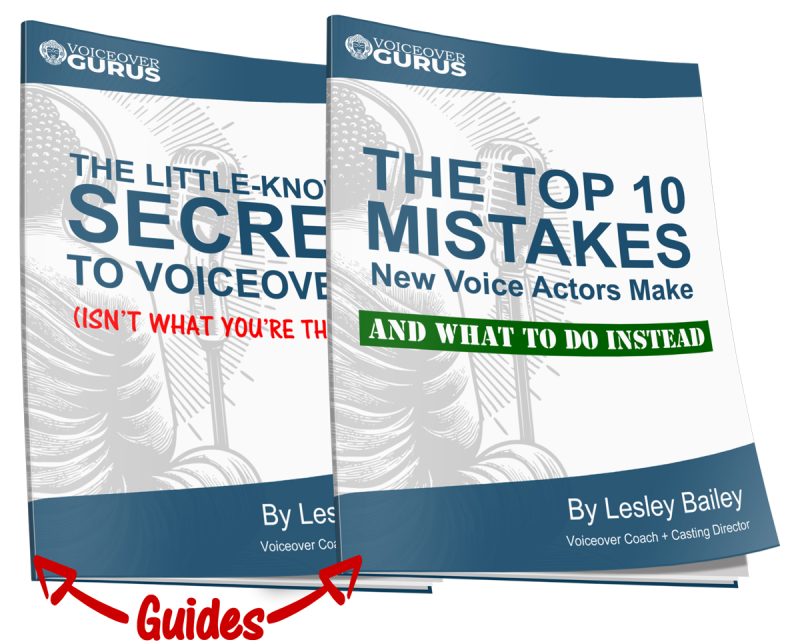After casting, coaching, and directing demos for almost thirty years, the awareness around the nuances surrounding a great VoiceOver performance start to add up. While there are so many techniques in voice acting – that’s the one element right there that counts the most…the acting. So let’s start there.
What is acting? It’s make-believe. Yes, it’s the childish way of explaining it, but it is accurate. You must Make yourself Believe. If you don’t, who will? So now we get to the script. Breaking down a script on voice over is absolutely essential for nailing the acting. Acting starts with context and then delves into subtext. So you start with the most basic question – “What is this about?” Make sure you can answer that in your own words and cover as much of the context as you can, whether it’s for a commercial or an audiobook. Knowing the context as fully as possible will also help you connect to your keywords in every single sentence. When we communicate, we have a point to make, which has us emphasizing certain words over others. When you understand the story you are telling you will also be able to connect with those keywords. Your second question is the more challenging one. “What do I feel about this….what is the emotional tone…the mood….my character’s personality?” This helps you paint the picture of the story with richer color and gives it believability. It has you transcend any possibility of sounding like you’re an “announcer.” So on assessing context, make sure to never stop with a statement like “It’s just informational.” If it does feel info-dense, at the very least tell yourself you are interested in it and interested in sharing it with someone. This will have you sounding engaged. This is crucial. You will never sound like you’re just reading if you sound interested and engaged in what you’re saying! Believe you have these thoughts, these feelings, believe you really want to share this all with someone. This is the acting. Make Believe.
For you technical-minded thinkers out there we can also add a few other elements to work with. Your tools. These are things that happen when we talk and they happen automatically. They almost always relate to our emotional perspective. These main tools are INFLECTION, PACING, and VOLUME. We also could classify KEYWORDS as a tool, but assessing these comes from a more intellectual place than an emotional one. Executing the keywords correctly, however, does require putting emotion into them. Let’s get back to inflection. We all talk in high and low tones, rising and falling inflections, otherwise we would be monotone. Our higher tones often reflect open and positive emotions like excitement, enthusiasm, friendliness, questioning. Our lower tones often exude certainty, confidence, authority, finality. A blend of both is the best of both worlds. But really, they have to reflect the writing and therefore be used accurately. Ending a sentence on a down inflection will give the air of conviction to the listener. It will sound like the speaker has absolute certainty in this fact. Ending a sentence with an up inflection can do many things depending on the context: it could make it sound flimsy, as if it’s not finished. it could make it sound exciting. it could make it sound uncertain. Knowing your context and subtext is critical to using the right inflections.
Volume is a big topic in VoiceOver. For the most part, avoid raising your volume too much unless the emotion calls for it (anger, over the top excitement…) because otherwise you will sound like an announcer or sound too theatrical. We all want to feel like someone is speaking to us personally, not to a stadium full of people. This means using a lower voice. Not a whisper. Just enough to make it Personal. Your audience will LEAN IN TO YOU, as opposed to cringing and pulling back. Again you must use context and subtext. Is it a one-on-one conversation? That is most likely in vo. Is it exciting? Maybe a slight bump in volume. SLIGHT. Is it a sincere conversation? Lower your volume a touch. Always err on the lower side when in doubt.
Pacing. Again we assess the pace based on real life. Excited? Talk a bit faster. Serious, intellectual, warm? Little slower.
Also make sure to pause the right amount between sentences and to adjust this as well based on the emotional energy of the script. Too long or too short a pause between sentences will trigger our ears in an unnatural way and we will hear your performance as “reading.”
Let’s address voice acting technique in terms of musicality. Our ears tune in to music, it grabs our attention and concentration. It is the perfect blend of pattern and unpredictability that is so pleasant. Think about a white noise machine. They are meant to be ignored because of their monotone repetition. So make sure you don’t audition for a voice over script this way! We have natural musicality to our voices based on emotional tone but also on how words connect to each other. This would be called our leading and key words. Here’s an example of a leading word (which goes up as if to say there’s something important coming) and a key word (which goes down as if to say this is it, this is the important thing right here!). It would be the classic “The end.” Think about it. We go up on The because it’s not important, it’s leading into what’s important. We go down on End because it tells us the important thing we need to know – that this is over. You can find these pairs in every sentence but the pair might not be next to each other. Here’s an example – “The best way to do it is to just relax.” Here we see the word Best is leading into the key word Relax. We can assume by the word “it” that we have already covered the subject matter. Regardless, in this way you can see how words are always leading into other words and therefore guarantee a fluctuating inflection.
It’s incredible what a set of codes we have embedded into the way we communicate that is so deeply indoctrinated we don’t ever have to think about it when we talk. Except…when we are reading someone else’s words! So yeah, now we do have to think about it. We talk perfectly natural in our everyday lives, but there’s nothing natural about reading someone else’s words. This is why understanding those words until they become our own is the way to sound natural in voice acting. One way to try this would be to first read the script out loud but in a quiet voice, as if you’re reading it out loud to yourself to just understand it. Another way is to read the script but give yourself creative license to add and subtract words, lead in with an entire sentence even. Share the script in a way that feels more like you would say it. Heck, even just read the script a few times until you understand it and then improvise the entire thing. By the time you want to audition for it, you’ll have emotional ownership of the material and will probably be able to read the script verbatim because you first got there emotionally on your own terms. I have some students who always start with a sentence of their own, maybe even including the name of an actual friend so it feels like a real conversation – they just delete it out later. Win win! Still feel like a phony announcer? Read the script with a phone to your ear. Triggering yourself to feel the way you do when you’re actually on the phone may control your volume and even more importantly have you sound the natural way you do when talking to someone you’re close with. Another win. Talk with your hands. Talk with your face. Your body filters energy and emotion through your voice. If you’re excited, take your hands out of those pockets! Make sure to energetically align your body with the tone of the script. In the end, it’s about the text. The deeper you understand the intellectual and emotional components of your text, the more jobs you will win. Let the text be your director. Do what it tells you. It’s the boss.


 Hi! I’m Lesley Bailey. I’m an award-winning Casting Director, Voiceover Coach, Demo Producer, and Consultant with over 30 years “in the trenches”. I love helping voice actors bring scripts to life with authenticity and confidence.
Hi! I’m Lesley Bailey. I’m an award-winning Casting Director, Voiceover Coach, Demo Producer, and Consultant with over 30 years “in the trenches”. I love helping voice actors bring scripts to life with authenticity and confidence.